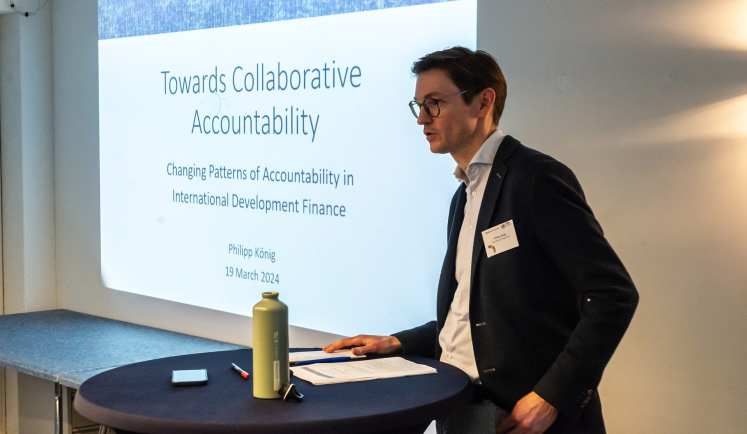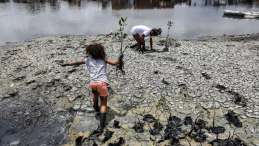In this blog, Philipp looks back on his PhD journey, together with reflections from his promoter Prof. Dr. Mark Bevir and supervisor Dr. Mindel van de Laar.
Accountability mechanisms of development finance institutions
Philipp König (PK): The focus of my thesis is on the complaints offices (also known as accountability mechanisms) of development finance institutions (DFIs), and more specifically on one of their accountability instruments: dispute resolution. Dispute resolution brings together the project implementers and the affected communities to proactively address concerns about the impacts of the financed projects on the ground. To give a concrete example: imagine that a DFI provides funding for a road project, and then the construction of the road creates significant air and noise pollution. The affected community is concerned about this pollution and files a complaint. The complaints office of the DFI then convenes a collaborative dialogue process between the community and the project implementer. This form of collaborative accountability has received little scholarly attention in the past.
Relevance of this study
PK: The thesis closely aligns with my work at the European Investment Bank Group, which inspired the thesis topic. I wanted to better understand the history of why DFIs introduced dispute resolution to complement the existing accountability arrangements. Moreover, I wanted to better understand how different practitioners conceive dispute resolution as an accountability instrument. I could not find answers to these questions in existing research. What also puzzled me was that there was little scholarship on the collaborative potential of accountability compared to other areas of governance, such as collaborative policy design and implementation.
Mark Bevir (MB): While the thesis aligned with Philipp’s work, it was situated in a lively scholarly literature. Governmental organizations increasingly work with and through private and voluntary sector ones to promote policies and deliver services. These new patterns of governance challenge traditional models of accountability taking place within hierarchic bureaucratic organizations. Scholars and practitioners alike are therefore increasingly concerned with new types of accountability that might operate across networks of organizations with more horizontal relationships.
PK: I am convinced that, particularly in the field of public administration, scholarly work and practice should not be detached from each other. Public organizations in general, and development finance institutions in particular, benefit from close ties with the academic community, which can provide fresh perspectives and stimulate new ideas for practice. Working with academics also allows DFIs to benefit from methodological expertise in rigorous data collection and analysis to inform policy design and implementation, ideally leading to better development outcomes for the projects they fund.
Dual career journey
Mindel van de Laar (MvdL): Philipp enrolled in the programme in March 2020, so of course the COVID pandemic had an impact on his PhD journey. Indeed, Philipp’s first physical encounter with Prof. Bevir will actually be on the day of his defense! Yet, with online meetings and feedback by email, Philipp was exceptionally well able to move his thesis forward.
MB: When I first realised that I’ve never met Philipp in person, I found it hard to believe. I have strong visual memories of him presenting his work in the classrooms at Maastricht. Obviously, those memories must be based on Zoom. They also suggest just how effectively Philipp worked under those conditions. It’s most important to meet students in person when something is slightly amiss and supervisors need to give a stronger steer to the direction of their research. When the student takes on feedback, manages their own work, and thinks through difficulties they encounter (just as Philipp did), supervisors really need to do little more than encourage them and get out of their way. So it really was a delight to work with Philipp.
PK: My PhD journey was indeed heavily influenced by the COVID-related travel restrictions, for better and for worse. The big advantage was that I suddenly had more time, and for the most part, I really enjoyed spending the extra time racking my brains over questions that I am very passionate about. Some spent the extra time on home improvement projects, I wrote a dissertation. The downside was that I could not travel and interview people in person. So, unfortunately, I had to adjust the original scope of my research.
Frankly, the thesis is just a starting point. I want to publish the research and also share some of the key findings with practitioners. The beauty or added value of my research lies not in the thesis or the title, but in being able now to share my lessons and potentially improve practice.
MB: I mentioned earlier that scholars and practitioners are increasingly concerned with new types of accountability. It’s possible we will conclude that none of these allow citizens and society to exercise effective oversight of the networks that have proliferated across government. Nonetheless, it’s hard to imagine a return to the older patterns of governance. At the very least, therefore, we should all be searching for and assessing new models. That is what Philipp has done. Collaborative approaches to accountability have the great merit of engaging citizens and social organizations in the process. The more we can learn about them the better.
MvdL: As supervisors, but also as an institute, we are of course happy to continue working with Philipp on getting the dissertation research published as well as potentially develop some educational workshops on the topic. But first, let us now focus on Philipp’s upcoming public defence!



